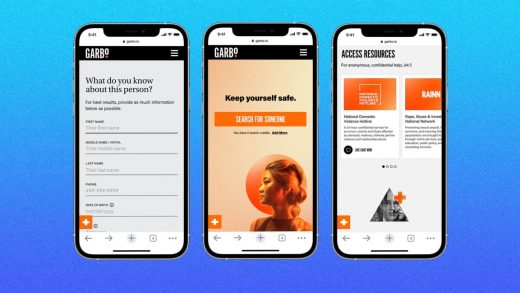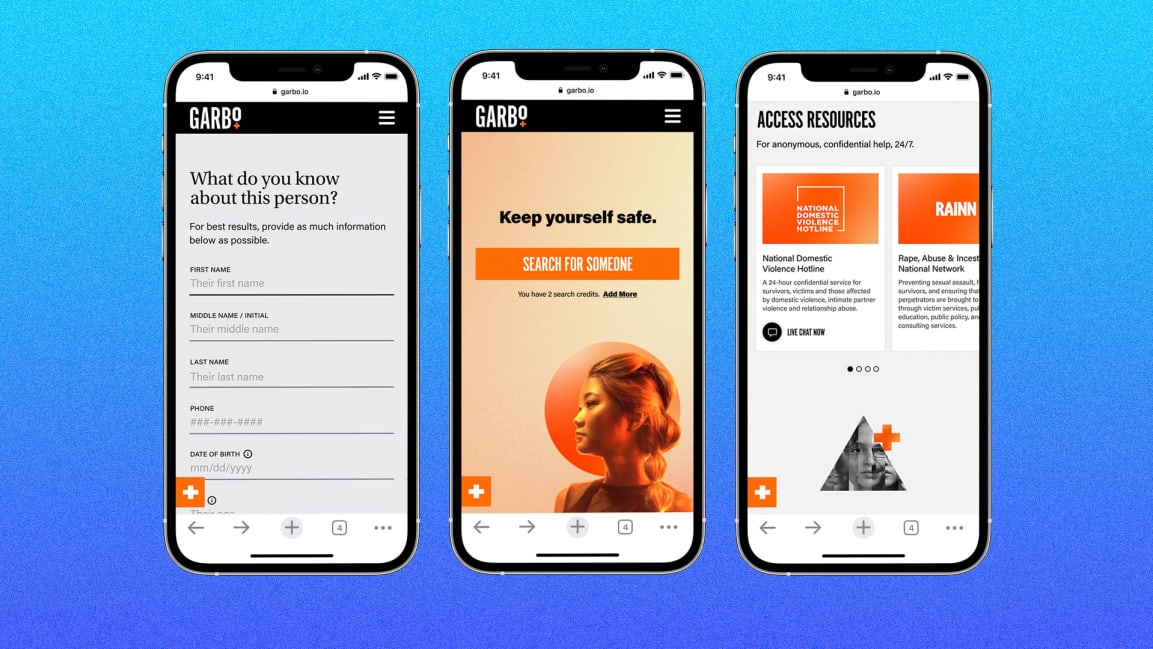Tinder wants to keep you safer with background checks that aren’t scammy
Today, Tinder is unveiling a powerful new tool to help people find information that’s never, ever going to appear in someone’s dating-app profile: whether they have a history of violent or harmful behavior.
The company is integrating background screenings, via a platform created by a new startup called Garbo, that the two companies have been collaborating on since 2020. Starting today, Tinder users can use the platform as a resource to search through police and court records, sex-offender registries, and other public records before swiping right, or even during first dates if they get red flags.
“We know that the biggest indicator of future abuse or violence is a history of these types of behaviors,” Garbo CEO Kathryn Kosmides explains. “In today’s digital age, we should know if we’re potentially putting our safety at risk.”
Tinder’s parent company, Match Group—which also owns Match, Hinge, and OKCupid—has reportedly made a seven-figure investment into this partnership to help Americans make better informed decisions about who they interact with. Today’s launch integrates Garbo into Tinder via the app’s Safety Center. (It’s expected to roll out on Match’s other dating apps soon.) It also marks the launch of Garbo as a standalone service available to the public.
“Corporations have to do more to help keep communities safe—not just online, but in real life,” says Tracey Breeden, Tinder’s head of safety and social advocacy. “We wanted this to be available for others in the industry, and we wanted it to be available to the public. It was important for us to invest in standing something up that creates safety for people beyond our user base.”
The partnership hints at how dating apps now have to consider safety as part of their brand. Everyone has a favorite dating-app “catfish” story. Last month, Netflix released a new documentary called The Tinder Swindler, about a conman who posed as the heir to a jewelry fortune to gain dates’ trust, then swindled millions of dollars from them.
Each Garbo search costs $2.50, plus a small processing fee. Tinder users are getting two searches for free.
Building a better background check
Traditional background checks have existed for ages, but they are often expensive to obtain, difficult to parse once you do, and, on top of that, inaccurate. They’re created by aggregating whatever can be pulled from various databases—from simple reverse-phone lookups, to property-tax assessments, motor-vehicle registrations, and sometimes criminal records. Because customers are paying to have the goods on someone, quantity generally beats quality. Or, if relying on these reports sounds unwise, a person can always request records state by state, paying for each inquiry.
This is why Tinder and Garbo saw an opening. Kosmides founded Garbo in 2018 after becoming a victim of gender-based violence herself. The experiences taught her that “it’s really hard to prevent the next person from becoming a victim of a bad actor, because of the inaccessibility of safety information.”
Last week, Kosmides gave Fast Company a walkthrough of the platform on Zoom. A common problem with background searches is not knowing whether you’ve found the correct person. Garbo searches allow users to input all the fields they know—name, phone number, state, date of birth—then lists results from high to medium to low odds of accuracy. Descriptions include physical traits like eye color, or a police mugshot if one is available (which Kosmides says is about 65 to 70% of the time).
Offenses are broken down into over 300 different categories: assault, driving under the influence, animal cruelty, fraud. If clicked, they get more granular, down to the resolution of the charge and what court it occurred in. Garbo also provides links to the actual criminal code—that way, users can read the law that was broken. (“Robbery in the first degree” means surprisingly different things depending on the U.S. jurisdiction you’re in.)
They also worked carefully to ensure the user’s search yields all the information to make an informed decision, while still protecting people’s right to privacy in the results. If users saw every criminal offense, a list could include minor traffic violations, marijuana possession, even, in some states, an abortion. Besides not being helpful indicators of harmful behavior, there’s also a history of marginalized groups being disproportionately targeted by such offenses in the criminal justice system.
Garbo didn’t want to perpetuate injustice, so it consulted with experts (the National Center for Victims of Crime, the Center for Court Innovation, EndTAB, and others), then built an algorithm that filters nonviolent, non-harmful, and non-offensive crimes from searches. “We care about violent and harmful behaviors,” Kosmides says. “The rest of that stuff is just noise—someone’s address doesn’t pertain to how safe they are.”
Finally, users also have the ability to connect with the National Domestic Violence Hotline directly. “This gives them an advocate,” adds Kosmides, “who can give additional resources on how to escape an abusive situation, but also how to understand more about what they’re actually seeing—or what they’re not seeing.”
Garbo focused on online dating first because “we feel like that’s the most potentially dangerous time to be meeting a stranger,” says Kosmides. “But really, the dangers apply to any online-to-in-person interaction.” She sees Garbo being an easy way to vet buyers on Facebook Marketplace or Craigslist. Or even coming in handy on social media; plenty of people affirm that they’d consider going on a date with someone who DM’d them.
(30)



